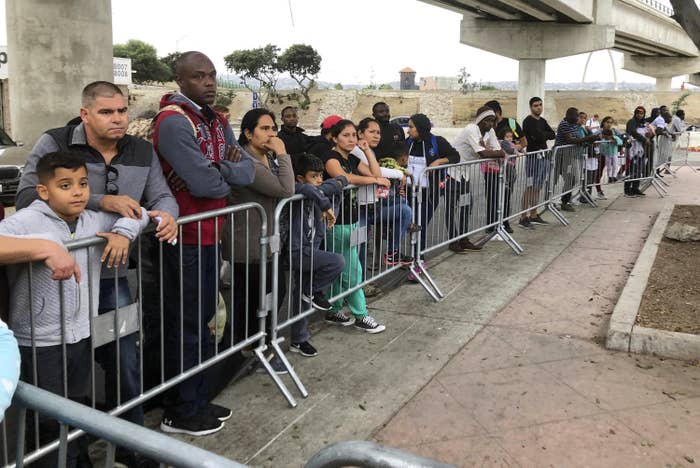The policy had allowed officials to deny green cards to immigrants who were deemed likely to use Section 8 housing vouchers, most forms of Medicaid, and other assistance.
Hamed Aleaziz BuzzFeed News Reporter
Last updated on November 2, 2020

Elliot Spagat / AP
Immigrants in Tijuana, Mexico, listen to names being called from a waiting list to claim asylum at a border crossing in San Diego on Sept. 26, 2019.
A federal judge on Monday blocked a key Trump administration policy that allows the government to deny permanent residency to immigrants who officials believe are likely to use public benefits.
The ruling by US District Court Judge Gary Feinerman is the latest in the back-and-forth legal saga over the “public charge” policy, which was a major initiative pushed by the Trump administration in its efforts to restrict immigration.
Immigrant advocates have long said the policy would change the face of immigration and discourage people from seeking public benefits, such as Medicaid. In recent months, they have warned the impact would be especially acute during the pandemic as immigrants weigh whether to enroll in publicly funded healthcare coverage.
In the less than a year since it’s been implemented, the policy has been blocked multiple times, though the administration has been successful in lifting the previous rulings. After Feinerman’s order in the Northern District of Illinois, a US Citizenship and Immigration Services (USCIS) official emailed immigration officers across the country informing them that the “judgment is applicable nationwide and is effective immediately.”
“USCIS must immediately cease implementing the public charge final rule,” wrote Daniel Renaud, a lead USCIS official. A spokesperson for USCIS also said in a statement that the agency "will fully comply with the decision and issue additional forthcoming guidance while the agency reviews the decision."
The Immigration and Nationality Act has long allowed the government to reject granting permanent residency to immigrants who were determined to be a financial burden on society, or a public charge, meaning they’re dependent on the government for financial support.
The Trump administration’s rule, however, altered how the government decides if someone is a public charge, allowing officials to deny green cards to those who are deemed likely to use the Supplemental Nutrition Assistance Program (SNAP), Section 8 housing vouchers, and assistance, public housing, or most forms of Medicaid.
The policy was implemented in late February.
“Donald Trump has continually tried to instill policies that penalize diversity. His administration’s attempt to shortchange immigrants by changing public charge threatens our public health and destroys communities that have immigrant populations who make these places across America great,” said Cook County State’s Attorney Kim Foxx, which brought the lawsuit that led to the ruling on Monday.
Last updated on November 2, 2020

Elliot Spagat / AP
Immigrants in Tijuana, Mexico, listen to names being called from a waiting list to claim asylum at a border crossing in San Diego on Sept. 26, 2019.
A federal judge on Monday blocked a key Trump administration policy that allows the government to deny permanent residency to immigrants who officials believe are likely to use public benefits.
The ruling by US District Court Judge Gary Feinerman is the latest in the back-and-forth legal saga over the “public charge” policy, which was a major initiative pushed by the Trump administration in its efforts to restrict immigration.
Immigrant advocates have long said the policy would change the face of immigration and discourage people from seeking public benefits, such as Medicaid. In recent months, they have warned the impact would be especially acute during the pandemic as immigrants weigh whether to enroll in publicly funded healthcare coverage.
In the less than a year since it’s been implemented, the policy has been blocked multiple times, though the administration has been successful in lifting the previous rulings. After Feinerman’s order in the Northern District of Illinois, a US Citizenship and Immigration Services (USCIS) official emailed immigration officers across the country informing them that the “judgment is applicable nationwide and is effective immediately.”
“USCIS must immediately cease implementing the public charge final rule,” wrote Daniel Renaud, a lead USCIS official. A spokesperson for USCIS also said in a statement that the agency "will fully comply with the decision and issue additional forthcoming guidance while the agency reviews the decision."
The Immigration and Nationality Act has long allowed the government to reject granting permanent residency to immigrants who were determined to be a financial burden on society, or a public charge, meaning they’re dependent on the government for financial support.
The Trump administration’s rule, however, altered how the government decides if someone is a public charge, allowing officials to deny green cards to those who are deemed likely to use the Supplemental Nutrition Assistance Program (SNAP), Section 8 housing vouchers, and assistance, public housing, or most forms of Medicaid.
The policy was implemented in late February.
“Donald Trump has continually tried to instill policies that penalize diversity. His administration’s attempt to shortchange immigrants by changing public charge threatens our public health and destroys communities that have immigrant populations who make these places across America great,” said Cook County State’s Attorney Kim Foxx, which brought the lawsuit that led to the ruling on Monday.
No comments:
Post a Comment